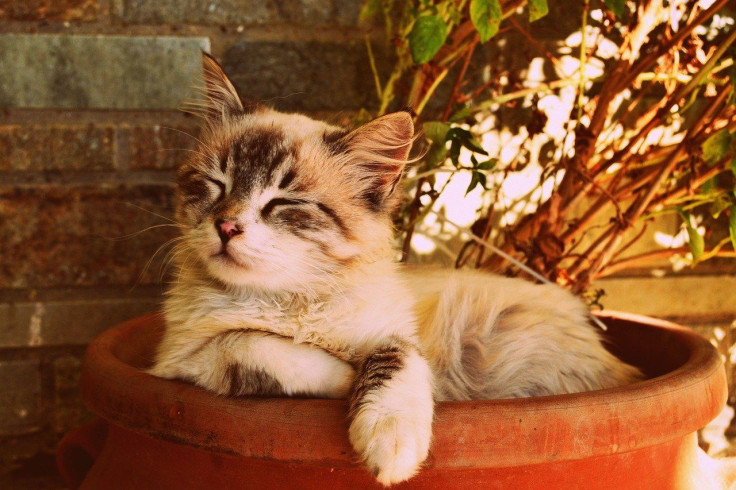Why Do Cats Love Catnip? It Gets Them 'High' And Protects From Mosquitoes
KEY POINTS
- Cats act strangely when they get exposed to catnip and silver vine
- Researchers identified nepetalactol as the active ingredient in silver vine
- Cats attracted fewer mosquitoes when they were exposed to nepetalactol
Why is it that cats go crazy for catnip and silver vine? It turns out, these herbs don't just get the felines "high," but they also protect them from pesky mosquitoes.
It's no secret that felines act oddly when they get exposed to catnip and silver vine, also a potent herb. Whether they're domesticated house cats or fierce jungle predators, the cats lick or chew on the plants, rub their faces against them and roll on the ground. This will go on for about five to 15 minutes until the felines become nonresponsive.
Catnip and silver vine, which is endemic to Japan and China, induce the same response in felines, but the exact biological function behind this odd behavior remains poorly understood. After all, it can't just be the "high" factor.
Nepetalactol gets cats 'high'
This is exactly what a team of researchers from Iwate University in Japan and the University of Liverpool in the U.K. wanted to find out in their new study, now published in Science Advances. They focused on nepetalactol, the potent bioactive compound in silver vine, and tested its response on felines, including 25 lab cats, 30 feral cats and even some big cats.
When they were shown two filter papers with and without nepetalactol, the felines preferred the one with nepetalactol and exhibited the same behavior that they showed when exposed to the herbs. By comparison, neither dogs nor lab mice responded the same way as the cats did.
The researchers were also able to confirm that nepetalactol, indeed, was the most potent substance after they exposed the cats to several bioactive iridoids. Nepetalactol present in silver vine and nepetalactone in catnip resulted in more prolonged rubbing compared to the other substances, but the researchers said nepetalactol was the "most suitable stimulant."
It appears that the cats' response to the substances is regulated by the opioid system in their brain. When the researchers tested the cats' endorphin levels before and after the exposure, it showed elevated levels after exposure to nepetalactol. But when they gave the cats naloxone, a drug used to treat an opioid overdose, they stopped exhibiting the rubbing behavior.
"Inhibition of the μ -opioid system specifically suppressed the rubbing and rolling response in the cats," the researchers wrote. "These results demonstrate that the μ -opioid system is involved in the induction of the feline behavioral response."
Mosquito-repellent effect
There has been evidence that catnip acts as a mosquito repellent when applied to humans. So the researchers tested whether the herbs actually had a similar mosquito-repellent effect on the cats when the nepetalactol or nepetalactone got transferred to their fur.
Interestingly, the cats exposed to nepetalactol attracted fewer mosquitoes.
The researchers said the mosquito-repellent effect could be a reason why cats exhibited the rolling behavior when exposed to the substances.
"The rubbing and rolling response transfers nepetalactol from the plant leaves onto the cat's face and head where it acts as a mosquito repellent, finally revealing the likely biological significance of this enigmatic feline behavior, first observed more than 300 years ago," the researchers wrote.
As small as they are, mosquitoes are actually considered to be one of the deadliest animals in the world, according to the Centers for Disease Control and Prevention. They spread diseases such as malaria, West Nile, yellow fever, Zika and dengue, causing more human deaths "than any other creature in the world." In 2017 alone, malaria killed 435,000 people.
"Although we only tested for a repellent effect on A. albopictus in this study, we might also expect nepetalactol to be repellent to other mosquito species including A. aegypti, which is a common vector of yellow fever, dengue, and Zika viruses, consistent with the broad repellence of nepetalactone across a range of mosquito and other biting arthropods," the researchers wrote. "Our findings suggest that nepetalactol may be a new natural candidate repellent to help reduce mosquito problems in human society."

© Copyright IBTimes 2025. All rights reserved.






















